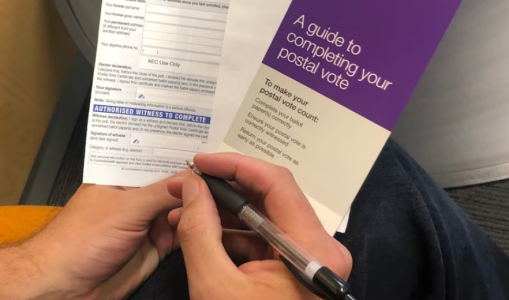Unexpected tactic raises concerns over personal information during election season
By
Gian T
- Replies 28
In an era where personal data holds immense value, Australians are warned about a subtle strategy used during election season.
As campaigns ramp up, voters are urged to stay cautious and safeguard their privacy.
Experts say understanding how information is collected can help prevent potential misuse.
The Australian Electoral Commission (AEC) has raised the alarm, noting that unsolicited emails and text messages from political parties and candidates are the top complaint they receive from voters.
These communications often contain links to apply for postal voting, which may seem convenient for those unable to vote in person on election day. However, there's a catch.
While the AEC is the only official channel through which voters can register for postal voting, political parties have set up their own websites that mimic the process.
These sites collect voter information before redirecting applicants to the AEC's actual postal vote application page.
The problem is that the political parties are not subject to the same stringent privacy regulations as the AEC.
Electoral Commissioner Jeff Pope has expressed concerns about handling voters' data.
'People should always carefully consider what they're doing with their personal information,' he said.
'The AEC takes privacy seriously and operates under the Privacy Act ... political parties don't have to.'
This means that your personal information could be used for purposes other than you intended, such as campaign targeting or other forms of political communication.
For instance, the Liberal and National parties operate a website at www.postal.vote, which collects full names, email addresses, mobile phone numbers, and home addresses before asking users to consent to share their details with the party.
Similarly, the Labor Party's website, howtovote.org.au/postal, requests the same information and redirects to the AEC application page after consent is given.
This practice isn't new; both major parties faced scrutiny during the last federal election for similar tactics.
Despite this, the approach persists, with the AEC receiving complaints and concerns from voters who feel misled.
The AEC has proactively shared these concerns with parliamentary committees and will continue to advocate for voter privacy.
'The AEC has shared these concerns with parliamentary committees in the past and will continue to do so in the future,' Pope added.
In the meantime, the commission calls for a 'respectful campaign' from all candidates and parties, reminding them of the rules around transparency in political communication.
Every electoral communication must include an authorisation statement so voters can identify the source of the information.
As we navigate the complexities of election campaigns and the myriad ways our data can be used, it's more important than ever to be cautious with our personal information.
Before clicking on any link or filling out any form, please take a moment to verify its authenticity.
If unsure, go directly to the AEC's official website to register for postal voting or access any election-related services.
Remember, your personal information is your own.
Don't let political agendas co-opt it without your explicit consent. Stay informed, stay cautious, and make your voice heard in a way that respects your privacy.
 Have you ever received unsolicited political messages or emails? How did you handle them? Do you think stricter regulations should be in place to protect voter information during election campaigns? Let us know in the comments below.
Have you ever received unsolicited political messages or emails? How did you handle them? Do you think stricter regulations should be in place to protect voter information during election campaigns? Let us know in the comments below.
As campaigns ramp up, voters are urged to stay cautious and safeguard their privacy.
Experts say understanding how information is collected can help prevent potential misuse.
The Australian Electoral Commission (AEC) has raised the alarm, noting that unsolicited emails and text messages from political parties and candidates are the top complaint they receive from voters.
These communications often contain links to apply for postal voting, which may seem convenient for those unable to vote in person on election day. However, there's a catch.
While the AEC is the only official channel through which voters can register for postal voting, political parties have set up their own websites that mimic the process.
These sites collect voter information before redirecting applicants to the AEC's actual postal vote application page.
The problem is that the political parties are not subject to the same stringent privacy regulations as the AEC.
Electoral Commissioner Jeff Pope has expressed concerns about handling voters' data.
'People should always carefully consider what they're doing with their personal information,' he said.
'The AEC takes privacy seriously and operates under the Privacy Act ... political parties don't have to.'
This means that your personal information could be used for purposes other than you intended, such as campaign targeting or other forms of political communication.
For instance, the Liberal and National parties operate a website at www.postal.vote, which collects full names, email addresses, mobile phone numbers, and home addresses before asking users to consent to share their details with the party.
Similarly, the Labor Party's website, howtovote.org.au/postal, requests the same information and redirects to the AEC application page after consent is given.
This practice isn't new; both major parties faced scrutiny during the last federal election for similar tactics.
Despite this, the approach persists, with the AEC receiving complaints and concerns from voters who feel misled.
The AEC has proactively shared these concerns with parliamentary committees and will continue to advocate for voter privacy.
'The AEC has shared these concerns with parliamentary committees in the past and will continue to do so in the future,' Pope added.
In the meantime, the commission calls for a 'respectful campaign' from all candidates and parties, reminding them of the rules around transparency in political communication.
Every electoral communication must include an authorisation statement so voters can identify the source of the information.
As we navigate the complexities of election campaigns and the myriad ways our data can be used, it's more important than ever to be cautious with our personal information.
Before clicking on any link or filling out any form, please take a moment to verify its authenticity.
If unsure, go directly to the AEC's official website to register for postal voting or access any election-related services.
Remember, your personal information is your own.
Don't let political agendas co-opt it without your explicit consent. Stay informed, stay cautious, and make your voice heard in a way that respects your privacy.
Key Takeaways
- The Australian Electoral Commission (AEC) is warning voters about unsolicited correspondence from political parties for postal vote applications.
- Voters are urged to be cautious with their personal information since political parties are not bound by the Privacy Act, unlike the AEC.
- The major parties have launched websites to collect voter information for postal voting, leading to concerns over privacy.
- The AEC emphasised that it is the only avenue for official registration for voting and reminds candidates to campaign respectfully and adhere to transparency rules.








